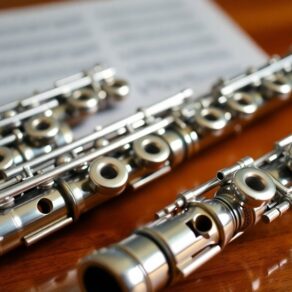Choosing the best flute for your child is key to fostering their love of music. Opt for durable materials like nickel or plastic, especially if they're just starting. Look for smaller, lightweight models that fit comfortably in their hands. Closed hole designs are easier for beginners, while reputable brands like Yamaha and Gemeinhardt guarantee quality and reliability. For young learners, consider options like the Yamaha YFL-222 or Gemeinhardt 2SP. By supporting their musical journey with the right instrument, you'll keep them engaged and motivated. There's a lot more to explore about fostering their progress and enjoyment.
Importance of Choosing the Right Flute
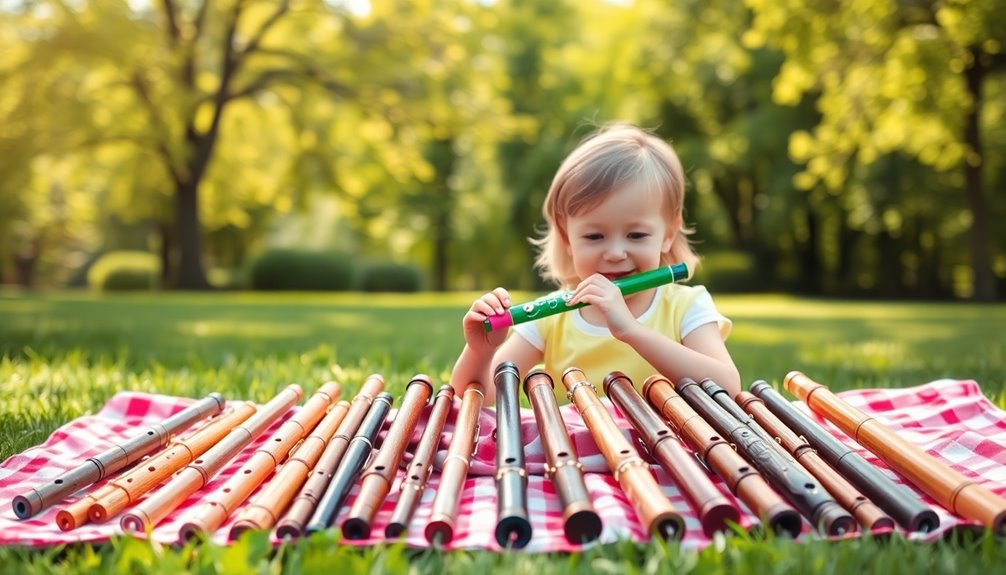
When it comes to your child's musical journey, selecting the right flute can make all the difference. The choice of flute materials plays an essential role in how your child will experience learning and playing this beautiful instrument. Flutes can be made from various materials, including silver, nickel, and even plastic. Each material offers unique characteristics that affect the overall sound quality and playability.
For beginners, a flute made of nickel or a plastic model is often recommended due to their durability and affordability. These materials aren't only easier to handle but can also produce a warm, pleasant tone that encourages your child to practice and improve.
Sound quality is another important factor to take into account. A well-constructed flute, regardless of the material, will produce a more resonant and clear sound. This clarity can inspire your child, fostering a deeper connection with music. When they hear the beautiful notes they can create, it enhances their motivation and enjoyment.
Additionally, the right flute can impact your child's confidence. A flute that feels comfortable and sounds good can boost their self-esteem and make them feel like they truly belong in the world of music. Choosing a flute from a reputable brand like Yamaha Flutes ensures that your child receives a high-quality instrument designed for ease of play and reliable performance.
Top Features to Consider
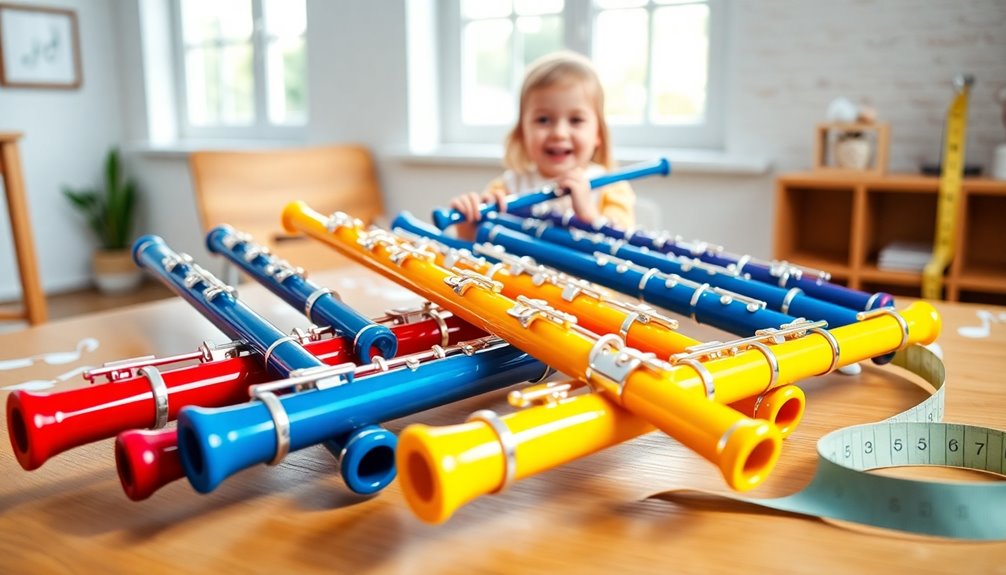
Choosing the right flute involves evaluating several key features that can enhance your child's learning experience.
One of the first things to think about is the materials used in the flute's construction. Most beginner flutes are made from either silver-plated or nickel-silver materials. Silver-plated flutes typically offer a warmer sound and are often more durable, making them a great choice for kids who might be a bit rough with their instruments. Nickel-silver flutes are usually more affordable, which can be appealing for parents on a budget.
Next, size options are essential. Flutes come in several sizes, including standard and smaller models designed specifically for children. If your child is younger or has smaller hands, a smaller flute will be easier to hold and play. This can greatly impact their confidence and enjoyment as they learn.
Another feature to evaluate is the key mechanism. Look for flutes with a closed hole design for beginners, as they're generally easier to manage. Open hole flutes may be better suited for more advanced players.
Lastly, don't forget to check the weight of the flute. A lightweight instrument will make it easier for your child to practice without fatigue. Additionally, selecting a flute from a reputable brand, such as Yamaha or Gemeinhardt, can ensure quality and reliability as your child begins their musical journey.
Recommended Flutes for Beginners
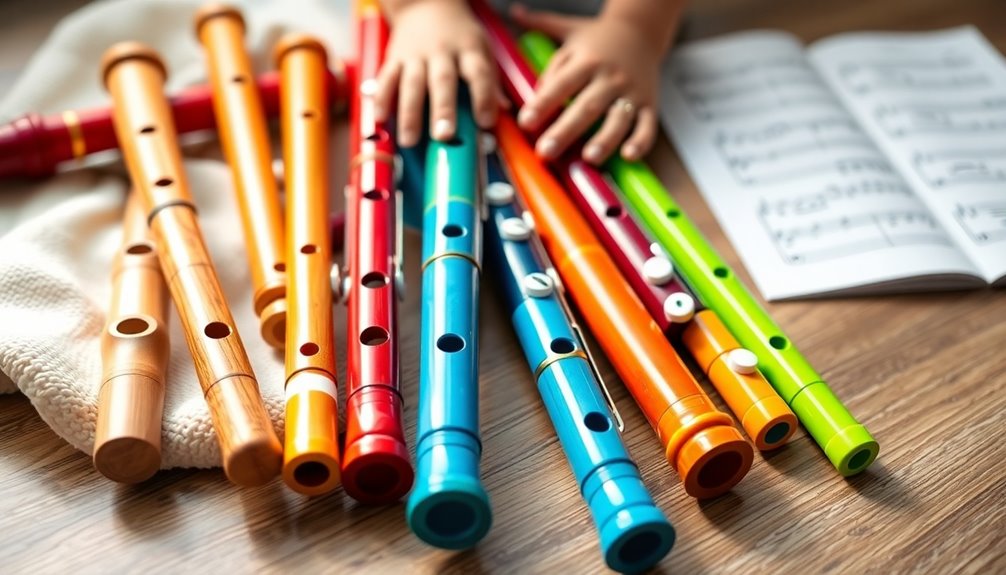
Finding the perfect flute for your child can feel like maneuvering through a maze, but it doesn't have to be overwhelming. With so many beginner flute types available, it's crucial to know which options will best suit your child's needs.
Here are some recommended flutes that stand out for young beginners:
- Yamaha YFL-222: Known for its durability and excellent sound quality, this flute is a popular choice among parents and teachers.
- Gemeinhardt 2SP: This model features a solid construction and is lightweight, making it easy for little hands to manage.
- Artley 18S: A great option for those on a budget, it offers a warm tone and is designed for beginners.
- Pearl 505R: This flute is praised for its smooth action and responsive keys, perfect for young learners.
- Jupiter JFL511S: With a robust body and reliable performance, this flute is excellent for kids just starting their musical journey.
When making a flute brands comparison, consider factors like sound quality, ease of playing, and price. Additionally, exploring top flutes for student musicians can provide further insights into the best options available.
You want your child to feel confident and excited about learning. Remember, the right flute can inspire a love for music that lasts a lifetime.
Best Intermediate Flute Options
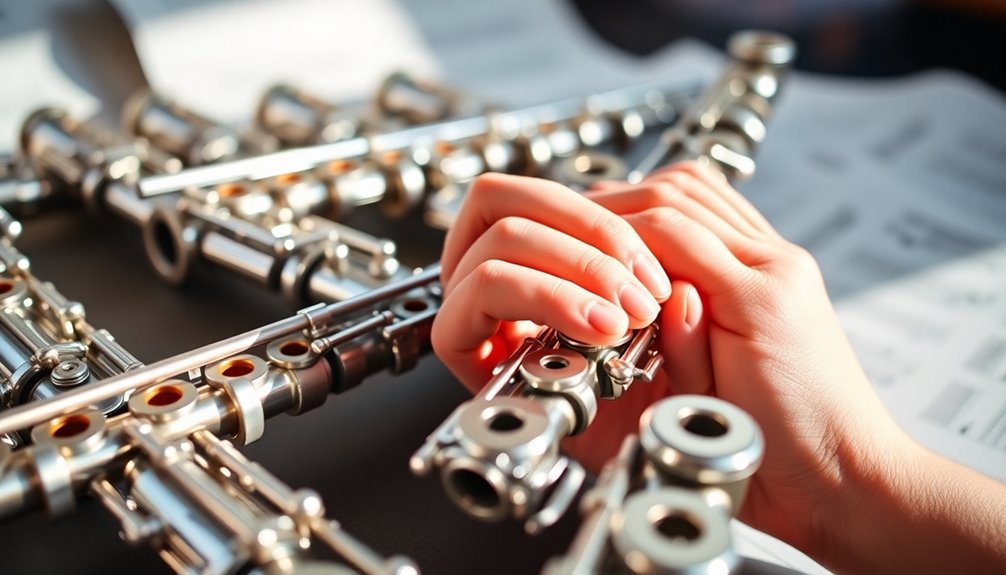
As your child progresses in their flute journey, it's time to explore intermediate options that can further enhance their skills and musical expression. Choosing the right intermediate flute can make a significant difference in their development and enjoyment of playing.
You'll find various reputable intermediate flute brands that offer quality instruments designed for young musicians ready to take their playing to the next level.
When evaluating flute upgrade options, look for features like a solid silver headjoint, which provides a warmer tone and better projection. Models from brands like Yamaha, Powell, and Gemeinhardt are excellent choices, known for their craftsmanship and durability.
These flutes often come with the option of open-hole keys, allowing for greater technical challenges and expressive playing.
You might also want to examine a flute with an offset G key. This ergonomic design can make it easier for smaller hands to reach the keys comfortably.
Additionally, many intermediate flutes come with a split E mechanism, enhancing the clarity of high notes, which is a bonus as your child tackles more complex pieces.
Investing in an intermediate flute not only supports your child's continued growth but also fosters their love for music. Discover premium intermediate flutes from trusted brands can help elevate your child's playing experience.
By choosing a quality instrument from a trusted brand, you're helping them feel more confident in their abilities.
Care and Maintenance Tips
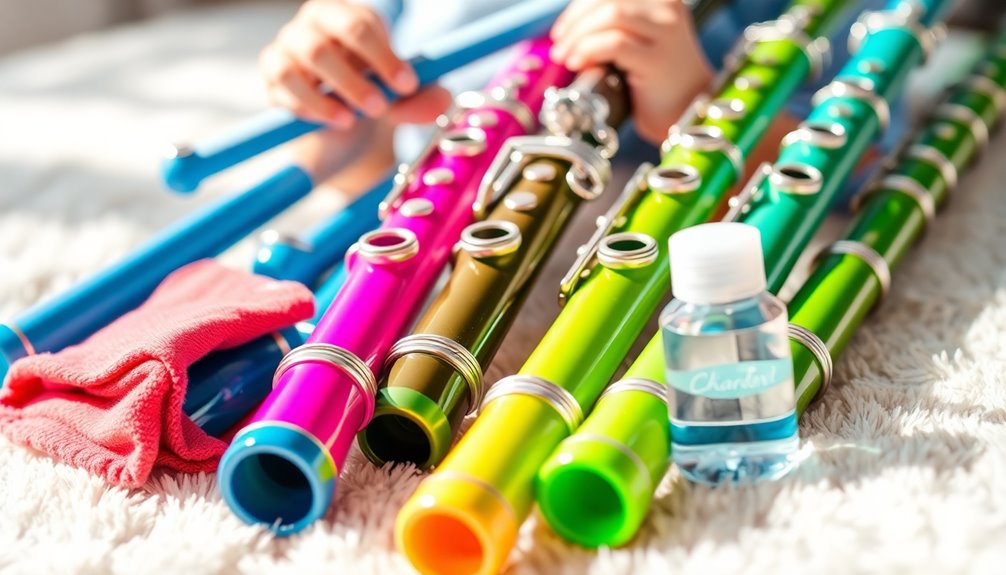
A well-maintained flute can be a child's best friend in their musical journey, guaranteeing smooth playability and a rich sound. By adopting some simple care and maintenance tips, you can help your child develop a lasting relationship with their instrument.
First, instill good cleaning techniques after each use. Encourage your child to wipe the flute down with a soft, lint-free cloth to remove moisture and oils from their hands. This practice helps prevent buildup that can affect sound quality. Additionally, using a cleaning rod and cloth can reach the inside of the flute, guaranteeing it stays fresh and resonant.
When it comes to storage solutions, keep the flute in a sturdy case to protect it from bumps and spills. Teach your child to store it in a safe, dry place away from direct sunlight or extreme temperatures. This will help maintain the flute's integrity and appearance.
Here are a few more tips to guarantee your child's flute stays in top shape:
- Schedule regular check-ups with a professional technician.
- Avoid eating or drinking before playing to minimize residue.
- Educate your child about handling the flute with care.
- Use a cork grease to maintain the pads and joints.
- Encourage your child to check for any loose screws or pads regularly.
- Consider investing in a Cecilio Flute Care Kit for effective maintenance tools like cork grease and polishing cloths.
Encouraging Practice and Progress
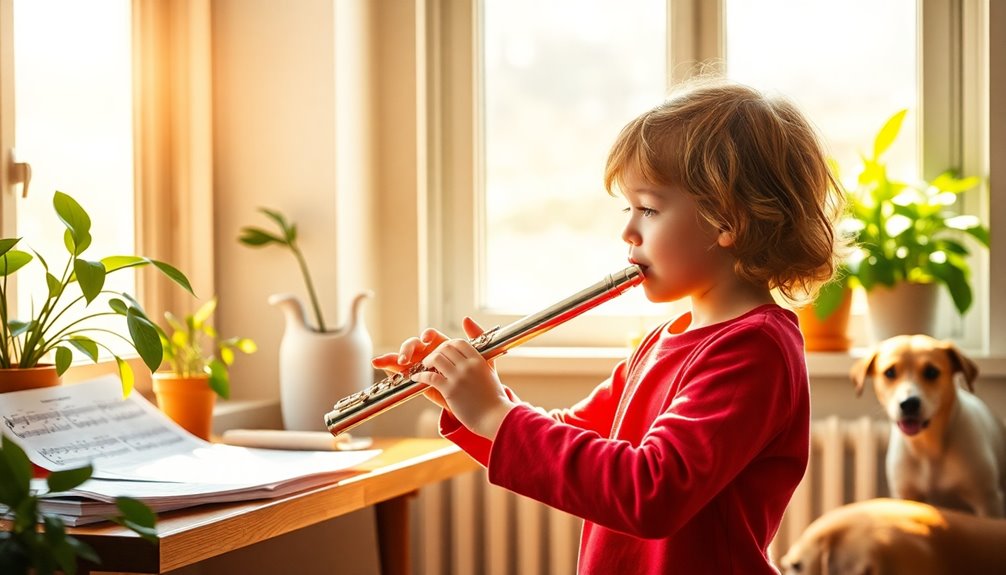
When it comes to nurturing your child's musical talent, establishing a regular practice routine is key to their progress and enjoyment. By creating a supportive environment, you'll help your child feel more motivated. Here are some effective motivation techniques you can use to encourage consistent practice:
| Motivation Technique | Description | Example |
|---|---|---|
| Set Achievable Goals | Break down their practice into small, attainable goals. | "Let's aim to master one new song this week." |
| Create a Schedule | Design a practice calendar that fits into their daily routine. | "We'll practice every day at 4 PM." |
| Use Positive Reinforcement | Celebrate achievements, no matter how small. | "You played that note perfectly; I'm so proud!" |
| Involve Friends or Family | Encourage group practice with friends or family members. | "How about a mini-concert for family this weekend?" |
| Track Progress | Keep a journal or chart of their improvements. | "Look how much you've improved over the past month!" |
Engaging your child in discussions about their goals and interests can further enhance their practice routines. Ask them what songs they'd like to learn or what aspects they find most challenging. This way, they'll feel a sense of ownership over their musical journey. Remember, the more involved and excited they are, the less it feels like a chore. With your support, they'll thrive and develop a lifelong love for music! Additionally, consider introducing them to educational benefits of learning instruments to inspire further growth and enjoyment.
Frequently Asked Questions
At What Age Can My Child Start Learning the Flute?
You can start your child on the flute around ages 7 to 10, but it really depends on their maturity and interest.
Younger kids might need more guidance, while older ones can handle lessons better.
It's also important to take into account their exposure to music; a musical environment can spark enthusiasm.
Encourage them to explore and express themselves, and they'll likely thrive in learning this beautiful instrument as they grow.
How Much Should I Expect to Spend on a Beginner Flute?
Imagine your child's first notes dancing through the air, a melody waiting to bloom.
When it comes to budgeting for a beginner flute, you should expect to spend anywhere from $100 to $500.
Keep in mind the flute features like material and keys can affect the price.
Are There Any Flute Brands to Avoid?
When choosing a flute, it's wise to steer clear of budget brands that skimp on quality materials.
These instruments often lack durability and can hinder your progress.
Look for reputable brands that prioritize craftsmanship; they'll provide a better playing experience and encourage your growth.
Remember, investing in a quality flute now means you'll enjoy music more and develop your skills faster.
You deserve an instrument that inspires your passion!
Can My Child Switch to Another Instrument Later?
Your child can definitely switch to another instrument later.
Embracing instrument versatility encourages musical exploration and helps them discover what they truly love. Each instrument offers unique experiences and skills that can enhance their overall musical journey.
Support their curiosity and let them try different options; it's all about finding their passion.
What Are the Signs My Child Is Ready for an Intermediate Flute?
Imagine your child, a tiny musician, skillfully playing a sweet melody on their flute. You might notice flute progression signs like improved breath control, a wider range of notes, and confident playing during group performances.
Check their intermediate skills checklist: can they play scales easily, read music fluently, and express emotion in their pieces?
If your child's showing these signs, it's time to contemplate stepping up to an intermediate flute and nurturing their passion further!
Conclusion
Choosing the right flute sets the stage for your child's musical journey. By considering key features, exploring beginner and intermediate options, and prioritizing care, you're supporting their growth and passion. Encourage practice, celebrate progress, and watch their confidence soar. With the right flute in hand, your child can explore melodies, express emotions, and create lasting memories. So, embrace the adventure together, nurture their talents, and let the music play!


